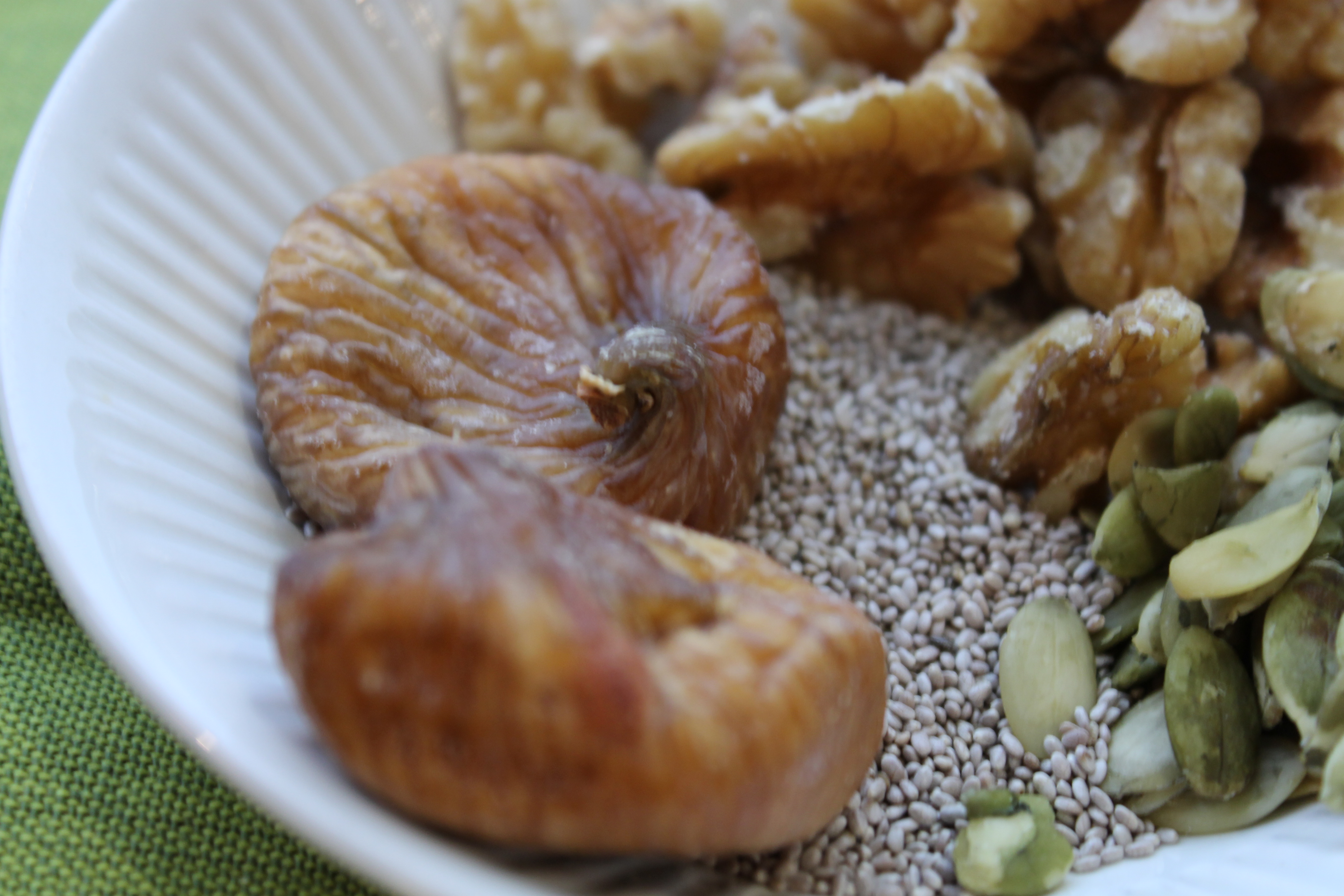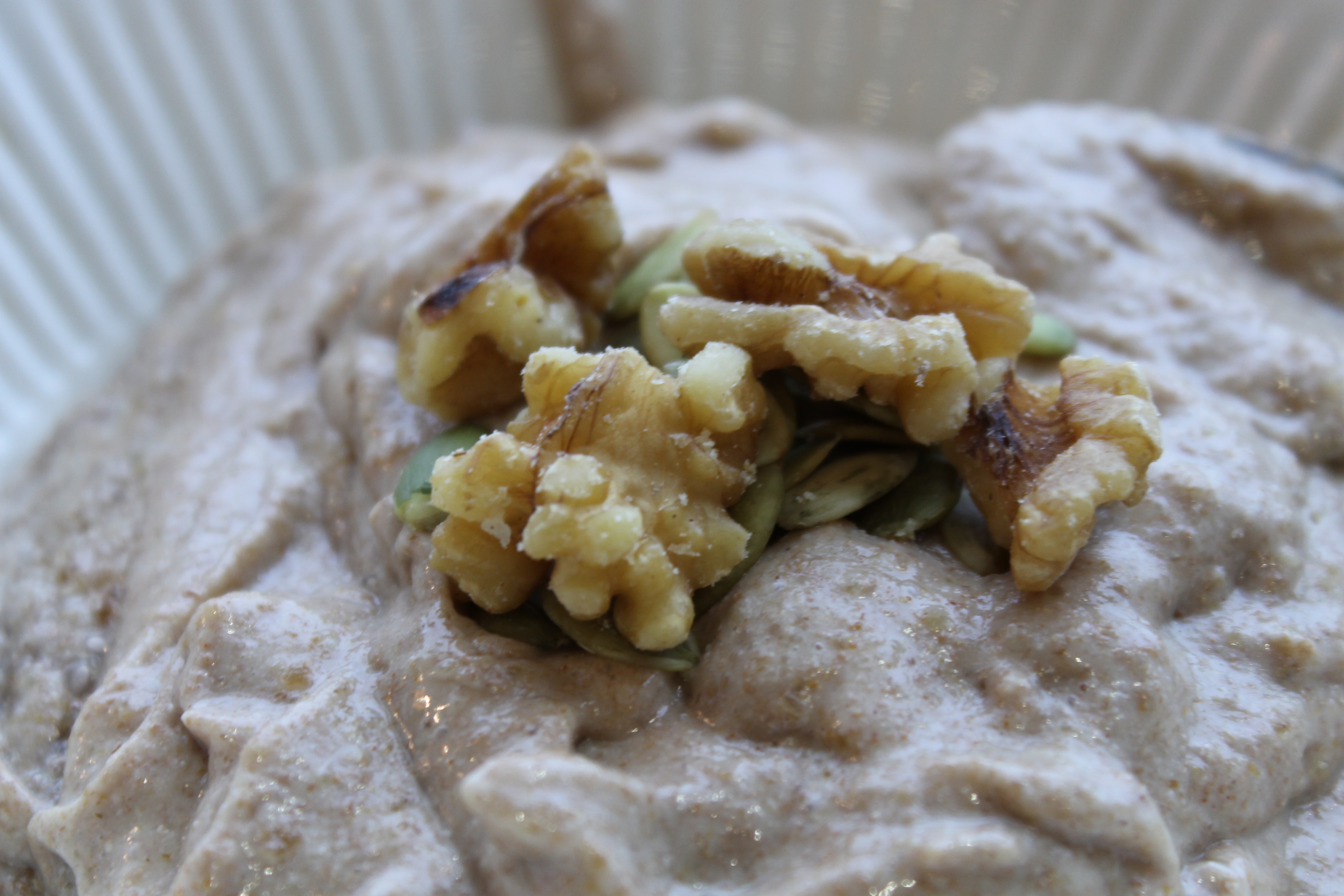After reading this article by Kimberly Snyder I decided to make my afternoon snack pack a powerful omega -3 punch. How did I do that? I made this amazing tasting pudding with chia seeds. The amazing thing was that I didn’t need any milk (dairy, soy or nut) to make it creamy and dreamy. Sweetened with dried figs it’s a pleasant departure from all the chocolate desserts I make.
Why are chia seeds so good for you?
Chia seeds (according to the nutrition label) contain 5x more omega-3 essential fatty acids (EFA) than omega-6. A standard North American diet usually has much more omega-6 EFAs and is severely lacking in omega-3 fats. Omega-6 fats play a healthy role in our well being but with the over-consumption of it in the form of processed foods (e.g. soybean oil, cottonseed oil, canola, safflower oil, etc) it becomes more dangerous than healthy. We need to balance it out by consuming more omega-3 fats.
Omega-3 fats are essential fatty acids, meaning the body cannot create them. They play a crucial role in brain function and in reducing inflammation in the body.
It is suggested that our ancestors thrived on a diet with a ratio of omega-6 to omega-3 EFAs of approximately 1:1 whereas in today’s diet people typically have a ratio of about 15 (or even 50) to 1. This is bad news as this higher ratio promotes proliferation of many diseases such as heart disease, cancer and inflammatory and autoimmune diseases. Changing the ratio to that of our ancestors decreases these deleterious effects[1]. In essence we have not evolved to eat as we do today!
A word of caution
Beware of hidden sources of oils. I found that the cinnamon used in Starbucks contains cottonseed oil! Which reminds me of another reason I try not to go to Starbucks.
What are some sources of omega-3 fats?
vegan
- leafy greens
- algae (where fish obtain their omega-3’s!)
- flaxseeds (ground, to release omega-3 )
- hemp seeds
- raw walnuts
- chia seeds
non-vegan
- fish and fish oil (but may contain high levels of mercury or shelved capsules of oil may be rancid)
Chia Seed Afternoon Delight
Ingredients: makes 2 servings
1/2 cup of chia seeds
2 cups of water or 1.5 cups of water and ice cubes (will make it more ice cream like)
4 dried, unsulfured figs
1 tsp of vanilla extract
a dash of cinnamon
*pumpkin seeds
*walnuts
Soak chia seeds in water for 10 minutes. They will become jelly like. Add the 4 figs, vanilla extract and cinnamon to your blender. Add chia seeds and blend baby blend. I have a vitamix so the chia mixture blends to a pudding-like consistency. Garnish with pumpkin seeds and walnuts.
*Sprouting then dehydrating these makes them more nutritious
I had a great afternoon knowing I balanced my essential fats ratio. Yes, that makes me very happy and it will make you happy too 🙂
Read more here:
http://en.wikipedia.org/wiki/Omega-3_fatty_acid
http://www.umm.edu/altmed/articles/omega-6-000317.htm
Reference:
[1] Biomed Pharmacother. 2002 Oct;56(8):365-79.




Always keep fish oil in fridges to keep it from going rancid.
Seeds as a source of omega 3s tend to be a poor idea: http://examine.com/faq/can-i-eat-flax-seeds-instead-of-fish-or-fish-oil-for-omega-3s.html
Hello,
I appreciate you taking the time to comment. It seems like you have a clear view on omega-3s but the issue is not so clear. This remains a controversial debate!
Fish oils in the fridge?
As for keeping fish capsules in the fridge that may prevent further deterioration but please make sure your provider has protocols in place to ensure no degradation or mercury contamination of the fish oil. DHA and EPA are very unstable compounds and easily become rancid.
Plants sources of omega-3:
Personally, I consume a plant based diet and incorporate many omega 3 foods into my diet including chia. While I agree with you that fish oil contains DHA and EPA and does not require as much conversion as does plant omega-3, I believe that by eating a very healthy and balanced diet (no processed foods, diet high in omega 6 oils) one can convert adequate amounts of ALA to DHA and EPA.
In one of Dr. Mercola’s articles he explains that elevated insulin levels can reduce the conversion of ALA to DHA and EPA and that 80% of the US (and I assume Canada) falls into this category. This may be why studies comparing vegans and vegetarians to their fish eating counterparts show lower levels of DHA and EPA. Many vegans eliminate meat only to incorporate more processed foods (such as pastas, bread, soy products) which elevate insulin levels[1].
Studies have shown that reducing fat intake from 45 to 20% of calories(30) enhances conversion rates to that of directly consuming direct sources of DHA and EPA like DHA-rich micro-algae.
Higher consumption of omega-6 fats also leads to lower conversion of ALA (omega-3) to DHA and EPA as they compete for the same enzymes. Therefore watching your intake of these is important too. Be sure to balance omega-3 and omega-6 foods in a ratio of 1:2 to 1:4[3-5].
The debate about how much omega 3 we need in our diet seems to be controversial. Perhaps a 5-15% conversion rate is all we need? DHA is the most highly unsaturated fat in our diet and is prone to easy oxidation in the blood by free radicals. Oxidized fats are BAD. They lead to disease including heart disease. If we had more of this EFA in our blood the likelihood of it being oxidized would be greater which is more likely to have a negative impact on our health[6].
Although there are more points to make I will end with this one; perhaps as DHA and EPA are produced only as needed by the body and are immediately taken to the tissues therefore blood plasma tests would not show increased levels of them as opposed to individuals taking the supplement directly[6].
At the end of the day diet and lifestyle are individual. There is not a pill you can just pop to ‘fix’ a nutritional deficiency. There are too many factors. Hopefully my points make you want to find out what works best for you. Remember we are all individual and what works for one person does not necessarily work for others. Test out different sources of omega-3s and see how you feel.
Happy experimenting!
References
[1]http://articles.mercola.com/sites/articles/archive/2008/05/27/why-fish-oil-is-not-the-best-omega-3-source.aspx
[2]Raatz SK et al. Total fat intake modifies plasma fatty acid composition in humans. J Nutr. 2001;131:231-34.
[3]Davis et al. Achieving optimal essential fatty acid status in vegetarians: current knowledge and practical implications. Am J Clin Nutr. 2003:78 suppl;640S-46S
[4]Indu et al. N-3 fatty acids in Indian diets-comparison of the effects of precursor (alpha-linolenic acid) vs. product (long-chain n-3 polyunsaturated fatty acids). Nutr Res. 1992;12:569-82.
[5]Masters. Omega-3 fatty acids and the peroxisome. Mol Cell Biochem. 1996;165:83-93.
[6]Davis and Melina. “Becoming Raw-The Essential Guide to Raw Vegan Diets”